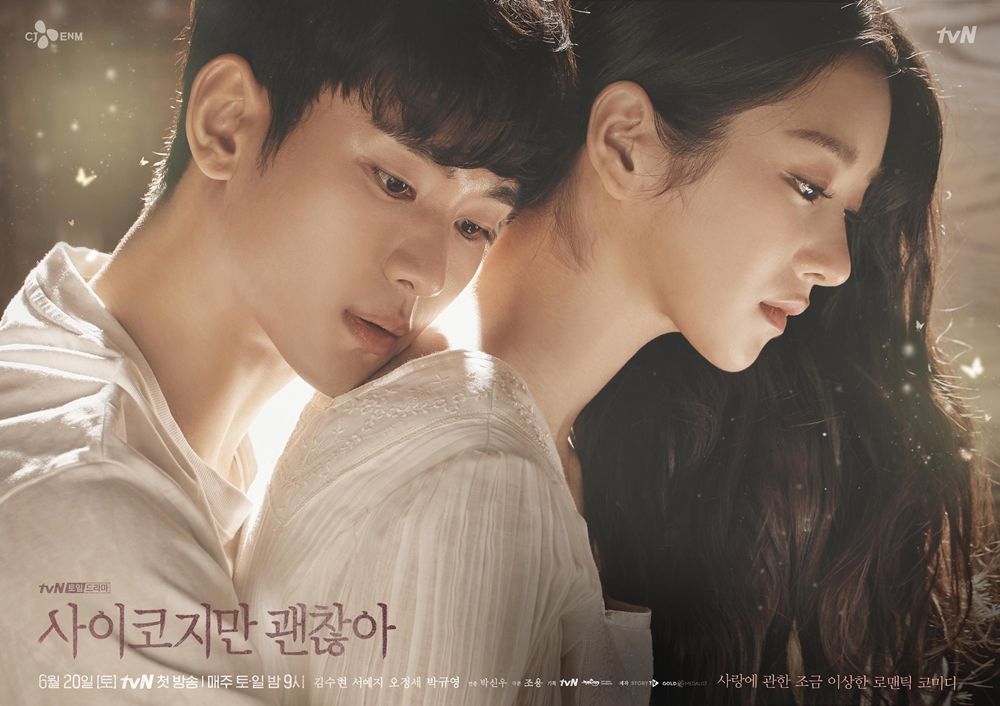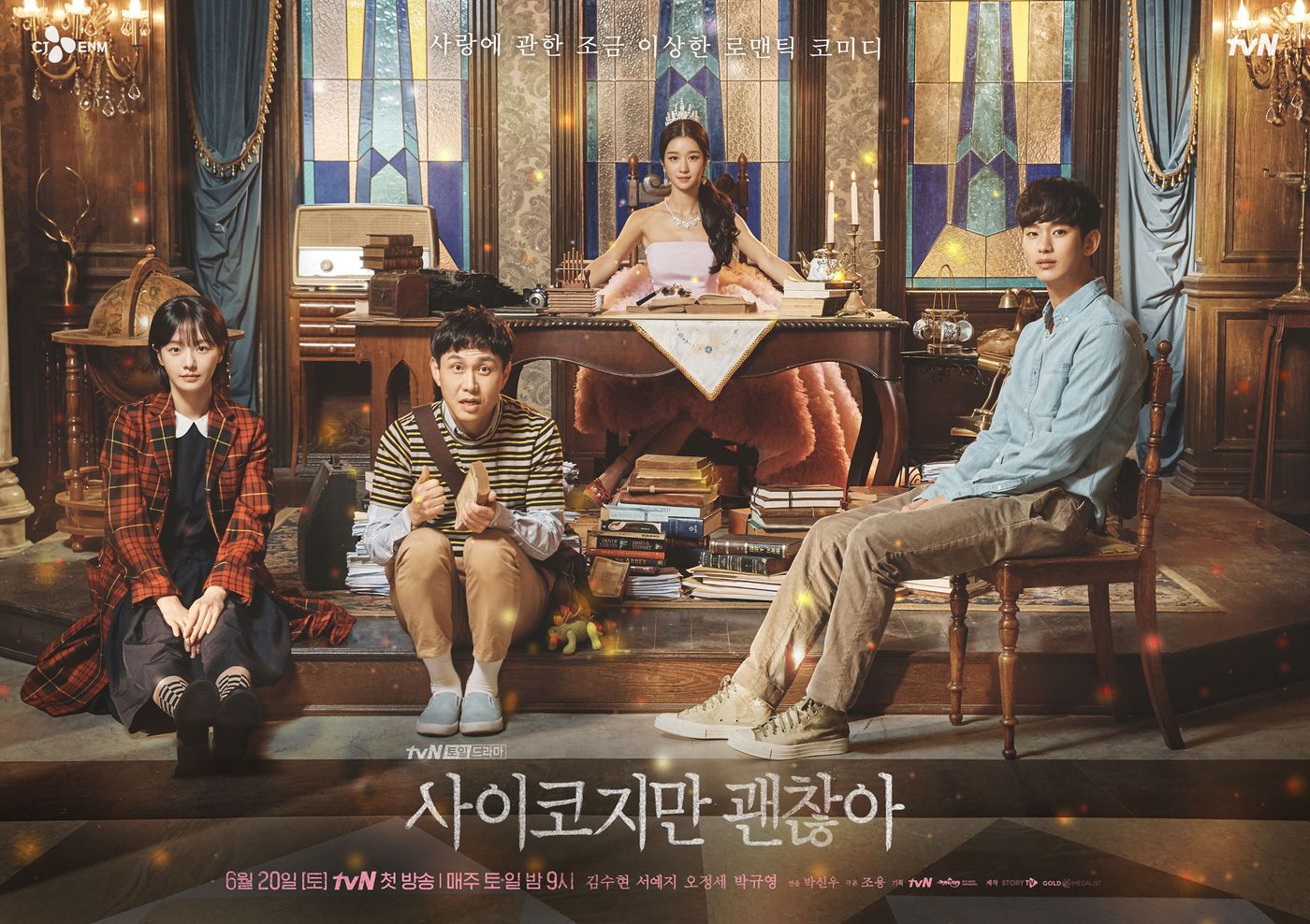Korean drama time of B series | "It's okay to be mentally ill"

Our bodies are honest,
Crying whenever you feel pain;
But our hearts are big liars,
Silent even in pain.
To be honest, "It's Okay, It's Okay" is a work that I feel a little shy after watching it, probably because the name is very similar to "It's Okay, It's Love", and it is based on the theme of exploring mental illness, even if the stills and trailers are presented The style of painting is fundamentally different from the lightness and brightness of "It's Okay, It's Love", and I still enjoyed the whole drama with the attitude of "It should be very healing!"
Different from the routine of two men and two women in previous romance dramas, "It's Okay Although It's Mental" has three protagonists : Wen Gangtai (played by Kim Soo Hyun, hospital nurse), Gao Wenying (played by Xu Ruizhi, children's book writer, anti-social personality) and Gang Tai The older brother Moon Sang Tae (played by Oh Jung Se, illustrator, autistic patient).

The screenwriter tried to use "butterfly" to run through the whole play, laying foreshadowing from two aspects, one is Gao Wenying's brutal killing of butterflies in childhood (the audience will finally understand that his behavior came from a reaction against his mother's strong desire to control), and the second is It is "Butterflies will hunt me down" - Moon Sang Tae's nightmare for most of his life. Sang Tae, who fell into extreme fear after witnessing the murder of his mother, not only did not remember the murderer's face, but also kept repeating "Butterfly is the murderer" in the transcript. . Since then, whenever flowers bloom and butterflies are flying in spring, when everything is about to prosper, it is the time when Gang Tai takes his brother to "escape the butterflies".
Gang Tai is the most painful and depressing character in the play. After his mother was killed, in order to prevent the two brothers from being placed separately by the social welfare group, he escaped with his brother and grew up while taking care of his brother. Being forced to grow up overnight and have to keep running away, Gang Tai learns to hide his dependence and even his emotions. In front of his elder brother Sang Tae, colleagues and patients in the hospital, and even his dear friend Jae Soo, he seems to be wearing a mask. , has never had a trace of happiness.
Although the reason for Gang Tai's role as a nurse is not clearly stated in the plot, it can be roughly deduced from the subsequent plot that it is convenient to learn the knowledge and skills of taking care of his brother and engage in this profession, not his ambition. In fact, the arrangement here is a bit unrealistic, because Gang Tai was probably in his teens at the time of the incident and logically did not have the ability to make a living, and the screenwriter did not give any special explanation for this - which made the play unable to deal with some details effectively. Here's where the fault emerges.
However, Cheng Ye Butterfly (referring to the progress of the plot depends entirely on the butterfly line), defeat Ye Ye Butterfly (the worst part of this play is the final butterfly mystery) . Although the screenwriter had a strong intention to add a suspenseful plot to the play, the last few episodes revealed the author without any suspense. The audience was stunned and had to try to digest all the flaws in the plot, especially how the murderer with an extremely distorted personality changed his name and changed his mind. Rong Meng deceived everyone? And the hasty and hasty rescue process when the murderer kidnapped the Wen brothers in the end failed to bring a strong sense of impact, and thus could not hide the unreasonable details.
Even so, that doesn't mean it's a show that isn't worth watching . In the arrangement of the theme of a single episode, we can still see the ingenuity of the screenwriter combining well-known fairy tales and picture books in the play, the stories of the supporting characters and the details that echo the main line, which are also much more exciting than the butterfly suspense line.
In terms of the theme of a single episode, "The Boy Who Grows Up Eating Nightmares", "The Dog of Spring", "Zombie Child", "Hand, Anglerfish" and "Finding the Real Face" are works by Gao Wenying in the play. The content can not only reflect Gao Wenying's childhood trauma, but also make Gang Tai face up to how vulnerable he is in his heart, and it can also play a certain role in the main line of love. "Wenying" is just a shell, only the words in the book are the real Wenying, who understands her interpretation and dissatisfaction with the world, all metaphors in her works.
As Li Xiangren, the representative of the publishing house, said, "Fairy tales are the only window for Wenying to communicate with the world, it is equal to her mouth and pores." And this fact has already been presented to the audience through Gang Tai's reading.
In addition, the screenwriter also used many famous fairy tales, such as Lady Red Shoe, Sleeping Beauty, Rapunzel, Bluebeard, Beauty and the Beast, The King's Donkey Ears, The Girl With Sheep, The Ugly Duckling, Romeo and Juliet, Rose With Red Lotus, etc., as the theme of each episode, we use fairy tale plots to interweave the current encounters and pasts of the protagonists and supporting actors. Through the audience's understanding of these well-known fairy tales, they can enter the plot faster and understand the screenwriter's metaphor; on the other hand Based on fairy tales, through the empathy between the characters and the audience, it is easier for us to empathize with the situation and reactions of mentally ill patients.
The story of the supporting characters is also a good place for the screenwriter to handle it, whether it is around the Moon brothers - Jae-soo, Joo-ri, Jo-ri's mother, the director of the OK hospital and the patients (especially the mink coat mother and the witch patient); Or the representatives of publishing houses, art directors, etc. around Wen Ying, their existence is not just to promote the progress of the love line, but each has the role of character and the task of deducing the plot, and the timing of entering and exiting is also very pleasing, not too much. Sticky and fickle. (For example, at the beginning I was worried that Julie would become the second female lead who gave up on the hero, but luckily it didn't!)
On the whole, this is a healing romance drama that contains various details in the plot after careful research. Since the concept that the screenwriter wants to convey has already covered everything from parent-child, doctor-patient relationship to mental illness, it is almost overwhelming. Why? If there is a side issue, what about adding the "Mystery of the Butterfly", a suspense line that has evolved to the end? This is the saddest part of my experience after watching the show. (The second pity is that the hero and heroine are childhood acquaintances.)
Like my work? Don't forget to support and clap, let me know that you are with me on the road of creation. Keep this enthusiasm together!

- Author
- More